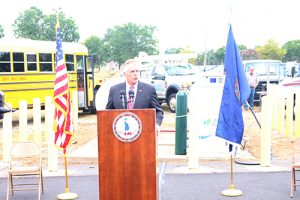Virginia hits milestone with autogas, alt fuel vehicles

Virginia Gov. Terry McAuliffe celebrates the state’s alternative fuel vehicle milestone in front of a propane autogas dispenser. Photo courtesy of Virginia Clean Cities.
Virginia’s state and local government fleets feature 319 vehicles that run on alternative fuels, including propane autogas, according to the Office of the Virginia Governor.
Virginia Gov. Terry McAuliffe unveiled the state’s Virginia Energy Plan in 2014, committing to accelerate the state’s development of advanced vehicle technology and the use of alternative fuels. Gov. McAuliffe set a goal for the state to reach 300 alternative fuel vehicles by the end of his term as governor. According to the Office of the Virginia Governor, Gov. McAuliffe hosted an event to celebrate reaching this milestone five months earlier than expected.
“I’m pleased to announce today that the Commonwealth has exceeded our goal of transitioning state and local vehicles to alternative fuels, and we’ve done so ahead of schedule,” Gov. McAuliffe says. “With our 2014 energy plan, we set out to expand access to alternative fuel vehicles in a way that was cost effective for the Commonwealth. This is a great step forward and we will continue to work to make Virginia’s the cleanest and most innovative vehicle fleet in the nation.”
A number of alternative fuel vehicles were on display at the event, as well as a propane fueling station at the Department of General Services central fleet facility. The event also featured light-duty propane trucks, vans and police interceptors, as well as heavy-duty propane school buses. Gov. McAuliffe also awarded Chesterfield County with the Governor’s Green Fleet Award for its leadership in alternative fuels by implementing 50 vehicles and five advanced fueling stations.
The Department of Mines, Minerals and Energy and the Department of General Services supported Virginia’s goal by establishing the public-private contracts that allowed for the installation of propane and compressed natural gas infrastructure and the purchase of vehicle conversions. These contracts paved the way for state agencies and local public bodies to have easy access to alternative fuel solutions.
















